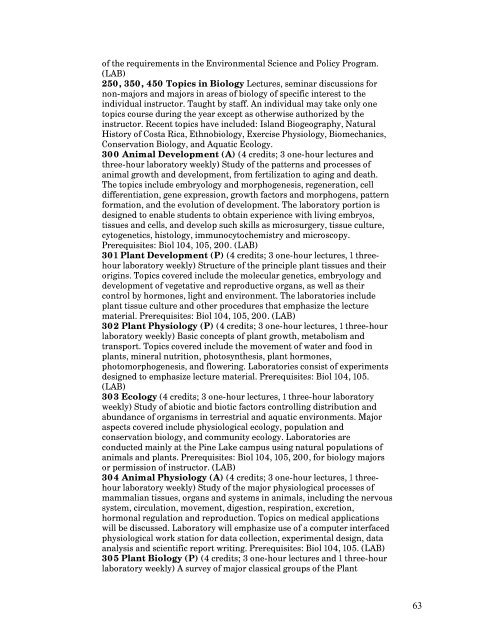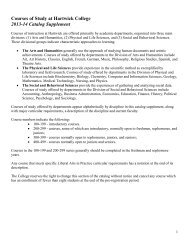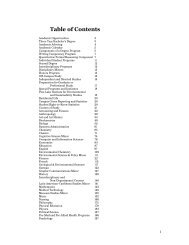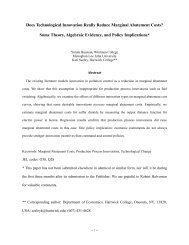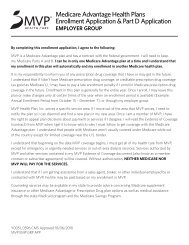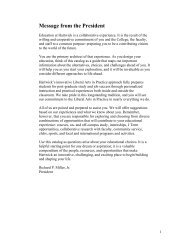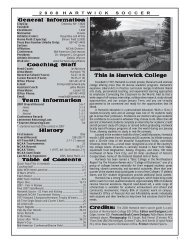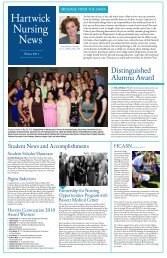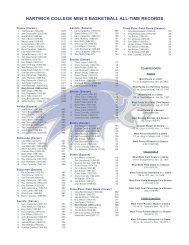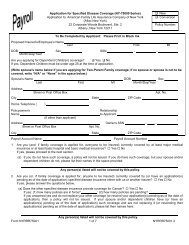Table of Contents - Hartwick College
Table of Contents - Hartwick College
Table of Contents - Hartwick College
You also want an ePaper? Increase the reach of your titles
YUMPU automatically turns print PDFs into web optimized ePapers that Google loves.
<strong>of</strong> the requirements in the Environmental Science and Policy Program.<br />
(LAB)<br />
250, 350, 450 Topics in Biology Lectures, seminar discussions for<br />
non-majors and majors in areas <strong>of</strong> biology <strong>of</strong> specific interest to the<br />
individual instructor. Taught by staff. An individual may take only one<br />
topics course during the year except as otherwise authorized by the<br />
instructor. Recent topics have included: Island Biogeography, Natural<br />
History <strong>of</strong> Costa Rica, Ethnobiology, Exercise Physiology, Biomechanics,<br />
Conservation Biology, and Aquatic Ecology.<br />
300 Animal Development (A) (4 credits; 3 one-hour lectures and<br />
three-hour laboratory weekly) Study <strong>of</strong> the patterns and processes <strong>of</strong><br />
animal growth and development, from fertilization to aging and death.<br />
The topics include embryology and morphogenesis, regeneration, cell<br />
differentiation, gene expression, growth factors and morphogens, pattern<br />
formation, and the evolution <strong>of</strong> development. The laboratory portion is<br />
designed to enable students to obtain experience with living embryos,<br />
tissues and cells, and develop such skills as microsurgery, tissue culture,<br />
cytogenetics, histology, immunocytochemistry and microscopy.<br />
Prerequisites: Biol 104, 105, 200. (LAB)<br />
301 Plant Development (P) (4 credits; 3 one-hour lectures, 1 threehour<br />
laboratory weekly) Structure <strong>of</strong> the principle plant tissues and their<br />
origins. Topics covered include the molecular genetics, embryology and<br />
development <strong>of</strong> vegetative and reproductive organs, as well as their<br />
control by hormones, light and environment. The laboratories include<br />
plant tissue culture and other procedures that emphasize the lecture<br />
material. Prerequisites: Biol 104, 105, 200. (LAB)<br />
302 Plant Physiology (P) (4 credits; 3 one-hour lectures, 1 three-hour<br />
laboratory weekly) Basic concepts <strong>of</strong> plant growth, metabolism and<br />
transport. Topics covered include the movement <strong>of</strong> water and food in<br />
plants, mineral nutrition, photosynthesis, plant hormones,<br />
photomorphogenesis, and flowering. Laboratories consist <strong>of</strong> experiments<br />
designed to emphasize lecture material. Prerequisites: Biol 104, 105.<br />
(LAB)<br />
303 Ecology (4 credits; 3 one-hour lectures, 1 three-hour laboratory<br />
weekly) Study <strong>of</strong> abiotic and biotic factors controlling distribution and<br />
abundance <strong>of</strong> organisms in terrestrial and aquatic environments. Major<br />
aspects covered include physiological ecology, population and<br />
conservation biology, and community ecology. Laboratories are<br />
conducted mainly at the Pine Lake campus using natural populations <strong>of</strong><br />
animals and plants. Prerequisites: Biol 104, 105, 200, for biology majors<br />
or permission <strong>of</strong> instructor. (LAB)<br />
304 Animal Physiology (A) (4 credits; 3 one-hour lectures, 1 threehour<br />
laboratory weekly) Study <strong>of</strong> the major physiological processes <strong>of</strong><br />
mammalian tissues, organs and systems in animals, including the nervous<br />
system, circulation, movement, digestion, respiration, excretion,<br />
hormonal regulation and reproduction. Topics on medical applications<br />
will be discussed. Laboratory will emphasize use <strong>of</strong> a computer interfaced<br />
physiological work station for data collection, experimental design, data<br />
analysis and scientific report writing. Prerequisites: Biol 104, 105. (LAB)<br />
305 Plant Biology (P) (4 credits; 3 one-hour lectures and 1 three-hour<br />
laboratory weekly) A survey <strong>of</strong> major classical groups <strong>of</strong> the Plant<br />
63


